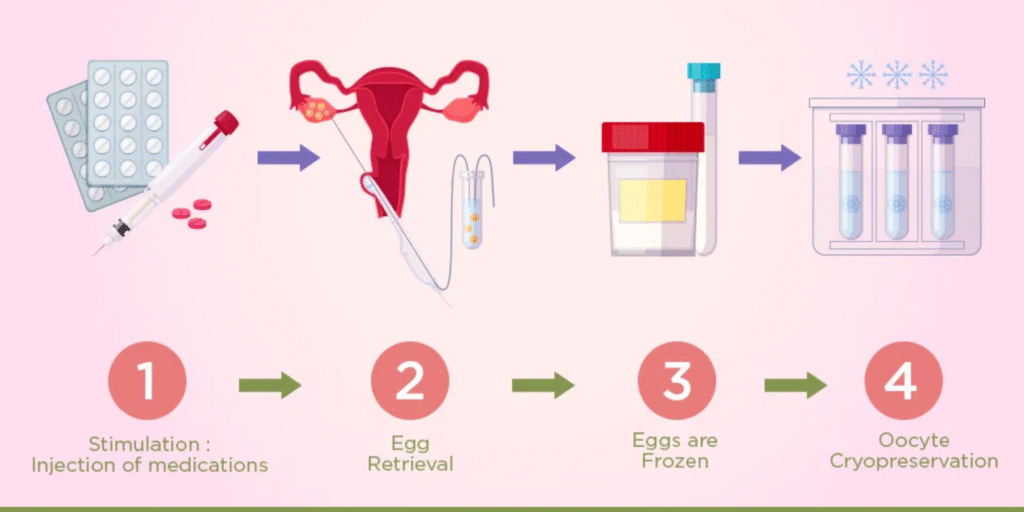Understanding Oocyte Freezing Cost & Success by Age
Preserving fertility through oocyte (egg) freezing is a life‑planning option gaining traction. For many women, concerns about the ticking biological clock and family planning lead to decisions about freezing eggs. But how age affects success rate and oocyte freezing cost is vital to make informed choices. Karthika Woman and Childcare brings you expert insight into how age influences both outcomes and expenses.
1. What Is Oocyte Freezing?
Oocyte cryopreservation involves stimulating the ovaries with hormones, retrieving mature eggs via a minor surgical procedure, and freezing them using vitrification for future use. When needed, eggs are thawed and fertilized via IVF. Success rates and overall costs are closely tied to a woman’s age at the time of freezing
2. Why Age Matters for Fertility
2.1 Egg Quality and Quantity Decline with Age
Women are born with a set number of eggs. As they age, both the quantity and quality (chromosomal integrity) decline. After age 35, the drop accelerates: by age 40 a woman’s ovarian reserve may be only 3% of her peak at age 30
2.2 Success Rates by Age Group
Success rates from frozen eggs, measured by live births, decline with age at freezing. Data from India shows:
- 18–25 years: 90–99% chance of at least one live birth
- 25–30 years: 80–90% chance
- 30–35 years: 75–85%
- 35–40 years: 60–65%
- 40–45 years: 50–60%
International studies also show after three cycles, live‑birth chances drop from ~31.5% at 25 to ~14.8% at 40 .
3. How Age Impacts the Number of Eggs Required
Because older eggs are fewer and less viable, more eggs and often multiple stimulation cycles may be needed to reach desired success probabilities. Clinics typically suggest freezing 10–20 eggs for optimal chance at one live birth. Younger women often freeze fewer cycles; older women may require more cycles, which adds cost and complexity .
4. Oocyte Freezing Cost Overview
4.1 Primary Cost Components in India
Typical cost breakdown in India includes:
- Consultation & fertility assessment: ₹5,000–10,000
- Hormonal stimulation medications: ₹40,000–70,000
- Egg retrieval procedure: ₹80,000–1,20,000
- Freezing (vitrification) & firstyear storage: ₹24,000–40,000
- Annual storage beyond year one: ₹10,000–25,000 per year
Total oocyte freezing cost in India ranges roughly ₹1,50,000–₹2,50,000 per cycle, with city variations and clinic reputation impacting price .
4.2 Additional Costs
- Storage renewal: ₹5,000–₹30,000 annually depending on clinic and duration.
- Future IVF use: Thawing, fertilization, embryo transfer costs per cycle may be ₹1,50,000–₹2,50,000 .
- Multiple cycles: If needed, each additional cycle incurs similar costs.
5. How Age Influences Cost
5.1 Younger Women (Below 35)
- Strong ovarian reserve → fewer cycles needed.
- Better egg quality → higher success → cost per potential birth is lower.
- Basic cycle cost ~₹1.5‑2 lakhs + modest storage.
5.2 Women 35–40 Years
- May require multiple cycles to achieve sufficient egg yield.
- Medications and monitoring may be more intensive.
- Total cost can reach ₹3–4 lakhs including second cycle and storage.
5.3 Women Over 40
- Low ovarian reserve often necessitates several cycles, and success per egg declines significantly (some clinics report only 50‑60% chance of live birth) .
- May consider donor eggs if self‑egg yield is too low, though that adds separate costs.
Overall expense may rise to ₹4–5 lakhs or more, with still lower odds.
6. Balancing Cost vs Success
6.1 Return on Investment
Freezing eggs is often viewed as an “insurance policy.” Younger age yields better success rates, making oocyte freezing cost more effective. Once older, both cost and risk increase.
6.2 Psychological Value
Many women report greater peace of mind after freezing—even if eggs are never used. However, it’s crucial to understand freezing is not a guarantee of pregnancy .
7. Tips for Prospective Candidates at Karthika Woman and Childcare
Early Evaluation
If you’re in your late twenties or early thirties, consider ovarian reserve testing now (AMH, AFC) to evaluate options while egg quality is higher.
Understand Number of Eggs Needed
Discuss how many eggs are needed for target success rates and whether multiple cycles may be required based on your AMH and age.
Finance Planning
Ask about clinic EMI plans, financing options, or package pricing for multiple cycles to spread the cost.
Choose the Right Freezing Technique
Modern vitrification yields better survival and thaw rates than older slow‑freeze methods. This may moderately raise oocyte freezing cost but improves outcome .
Long‑term Budgeting
Factor in storage for multiple years and future IVF costs so you’re prepared financially over time.
8. Why Choose Karthika Woman and Childcare?
Karthika Woman and Childcare supports thousands of women through personalized fertility preservation planning. Here’s why we are trusted:
- Transparent Pricing: Clear breakdown of oocyte freezing cost, storage, and future IVF expenses.
- Age‑tailored Guidance: From fertility evaluation to cycle planning, we guide based on your age and fertility profile.
- Advanced Technology: We use vitrification for superior egg survival.
- Comprehensive Support: Financing options, counseling, and long‑term care planning.
- Clinical Expertise: Experienced fertility specialists and personalized care at every step.
9. Summary Table: Age, Success & Cost
Age Range | Live‑Birth Chance per Cycle | Typical Oocyte Freezing Cost per Cycle (₹) | Notes |
18–25 | 90–99% | 1,50,000–2,00,000 | One cycle usually sufficient |
25–30 | 80–90% | 1,50,000–2,50,000 | High success with 1–2 cycles |
30–35 | 75–85% | 1,70,000–3,00,000 | May need 2 cycles based on yield |
35–40 | 60–65% | 2,50,000–4,00,000 | Consider multiple cycles |
40 + | 50–60% | 3,50,000–5,00,000+ | May include donor options |
10. Realistic Expectations & Emotional Considerations
- Oocyte freezing is not a guarantee—it’s a preparedness strategy
- Emotional burden, possible side effects from hormonal injections, and physical recovery from retrieval should be discussed in advance .
- You may never need to use the eggs—but if you do, they can provide invaluable reproductive autonomy.
11. Frequently Asked Questions
Q: Does insurance cover egg freezing in India?
A: Most Indian insurance plans don’t cover elective egg freezing. In medical cases (e.g. before chemotherapy), some partial coverage may be available.
Q: Can storage fees accumulate to be expensive?
A: Yes. Storage for 5–10 years could add ₹50,000–2,50,000 in fees alone.
Q: Can I freeze more eggs later if initial yield is low?
A: Yes, but costs stack per cycle. Clinics may provide package deals—ask upfront.
Conclusion
Age is the single most critical factor influencing both success rate and oocyte freezing cost. The younger you freeze eggs—ideally before age 35—the higher the chances of future pregnancy and the lower the financial burden. At Karthika Woman and Childcare, our fertility care integrates age-specific guidance, transparent costing, reliable freezing protocols, and supportive financing options.
Your fertility journey is deeply personal. We’re here to help you navigate it confidently—knowledgeably—on your terms.
📞 Contact Karthika Woman and Childcare
Phone / WhatsApp:+91 99728 99728
Email:info@karthikawomanandchildcare.in
Website:https://karthikawomanandchildcare.in/
Address: Cloudnine thanisandra, and Sahakar Nagar
We offer complimentary initial fertility consultation and age-based cost planning. Book your appointment today and plan your future with clarity and confidence.


